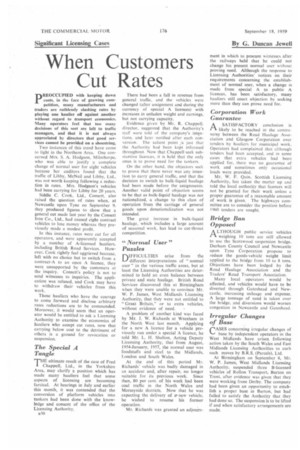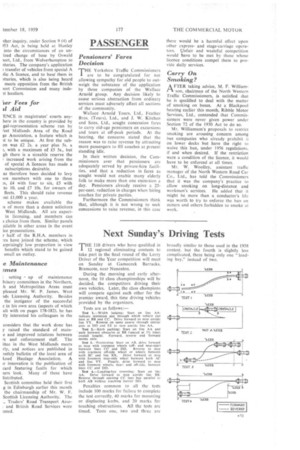Significant Licensing Cases
Page 64

Page 65

If you've noticed an error in this article please click here to report it so we can fix it.
When Customers Cut Rates
PREOCCUPIED with keeping down costs, in the face of growing competition, many manufacturers and traders are ruthlessly slashing rates by playing one haulier off against another without regard to transport economics. Many operators feel that too many decisions of this sort are left to trallic managers, and that it is not always appreciated by directors that good services cannot be provided on a shoestring.
Two instances of this trend have come to light in the Northern Area. One concerned Mrs. S. A. Hodgson, Miinthorpe. who was able to justify a complete change of normal user for eight vehicles because her auditors found that the traffic of Libby. McNeil and Libby. Ltd., was not worth keeping following a reduction in rates. Mrs. Hodgson's vehicles had been carrying for Libby for 20 years.
Siddle C. Cook, Ltd., Consett. also raised the question of rates when, at Newcastle upon Tyne on September 9. they produced figures to show that a general cut made last year by the Consett Iron Co., Ltd., had caused eight contract vehicles to lose money whereas they previously made a modest profit.
In this instance, rates were cut for all operators, and were apparently accepted by a number of A-licensed hauliers. including British Road Services. However, Cook rightly feel aggrieved because, left with no choice but to switch from a contract-A to an open A licence, they were unsupported by the customers at the inquiry. Consett's policy is not to send witnesses to inquiries. The application was refused, and Cook may have to withdraw their vehicles from this work.
Those hauliers who have the courage to come forward and disclose arbitrary rates reductions are to be commended. Moreover, it would seem that an operator would be entitled to ask a Licensing Authority to examine the economics of hauliers who accept cut rates, now that carrying below cost to the detriment of others is a ground for revocation or suspension.
The Special A Tangle
THAultimate result of the case of Fred appell, Ltd., in the Yorkshire Area, may clarify a position which has made many hauliers feel that some aspects of licensing are becoming farcical. At hearings in July and earlier this month, it was contended that the conversion of platform vehicles into tankers had been done with the knowledge and consent of the office of the Licensing Authority.
B30 There had been a fall in revenue from general traffic, and the vehicles were changed (after assignment and during the currency of special A licences) with increases in unladen weight and earnings. but not carrying capacity.
Evidence given by Mr. R. Chappell. director. suggested that the Authority's staff were told of the company's intentions, and later notified after each conversion. The salient point is just that the Authority had been kept informed throughout. Now that Chappell seek substantive licences, it is held that the only onus is to prove need for the tankers.
On the other hand, the objectors seek to prove that there never was any intention to carry general traffic, and that the decision to switch to bulk-liquid haulage had been made before the assignments. Another valid point of objection seems to be that as bulk-liquid haulage was not nationalized, a change to this class of operation from the carriage of general goods upon denationalization was not intended.
The great increase in bulk-liquid haulage, which includes a large amount of seasonal work, has lead to cut-throat competition.
Normal User,' Puzzles DIFFICULTIES arise from the different interpretations of " normal user" in the various traffic areas, but at least the Licensing Authorities are determined to hold an even balance between private and state haulage. British Road Services discovered this at Birmingham when they were unable to convince Mr. W. P. James, West Midlands Licensing Authority, that they were not entitled to "Great Britain," or to extra vehicles, without evidence of need.
A problem of another kind was faced by Mr. J. W. Richards at Wrexham in the North West last month. Applying for a new A licence for a vehicle previously run under a special A licence, he told Mr. L. H. Shelton, Acting Deputy Licensing Authority, that from August, 1954-January, 1957, the normal user was foodstuffs and steel to the Midlands, London and South Wales.
At the end of this period Mr. Richards' vehicle was badly damaged in an accident and, after repair, no longer suitable for its previous work. Since then, 80 per cent. of his work had been coal traffic in the North Wales and Merseyside districts. Now that he was expecting the delivery of a■ new vehicle, he wished to resume his former operation.
Mr. Richards was granted an adjourn ment in which to procure witnesses after the railways held that he could not change his present normal user without proving need. Although the response to Licensing Authorities notices on their requirements concerning the establishment of normal user, when a change is made from special A to public A licences, has been satisfactory, many hauliers still court objection by seeking more than they can prove need for.
Corporation Work Guarantee
1-1 A SATISFACTORY conclusion is likely to be reached in the controversy between the Road Haulage Association and Glasgow Corporation over tenders by hauliers for municipal work. Operators had complained that although tenders had been accepted, and in some cases that extra vehicles had been applied for, there was no guarantee of work and sometimes only occasional loads were provided.
Mr. W. F. Quin, Scottish Licensing Authority, has taken the matter up and told the local authority that licences will not be granted for their work unless a proper guarantee of a reasonable amount of work is given. The highways committee are to consider the position before 1960 tenders are sought.
Bridge Ban Opposed
LTHOUGH public service vehicles weighing 10 tons are still allowed to use the Scotswood suspension bridge, Durham County Council and Newcastle upon Tyne Corporation propose to reduce the goods-vehicle weight limit applied to the bridge from 10 to 8 tons. Objections have been lodged by the Road Haulage Association and the Traders' Road Transport Association. Many local operators would be affected, and vehicles would have to be diverted through Gateshead and Newcastle, increasing mileage and expense. A large tonnage of sand is taken over the bridge, and diversions would worsen congestion in Newcastle and Gateshead.
Irregular Changes of Base
rASES concerning irregular changes of
base by independent operators in the West Midlands have arisen following action taken by the South Wales and East Midlands Licensing Authorities to curb such moves by B.R.S. (Parcels), Ltd.
At Birmingham on September 8, Mr. W. P. James, West Midlands Licensing Authority, suspended three B-licensed vehicles of Rollon Transport, Burton on Trent, after evidence was given that they were working from Derby. The company had been given an opportunity to establish a proper base in Burton, but had failed to satisfy the Authority that they had done so. The suspension is to be lifted if and when satisfactory arrangements are made. tther inquiry, under Section 9 (4) of 153 Act, is being held at Hanley into the circumstances of an unized change of base by Oswald tort, Ltd., from Wolverhampton to otteries. The company's application e transfer of vehicles from special A dic A licence, and to base them in Merles, which is also being heard meets opposition from the British tort Commission and many indeit hauliers.
ier Fees for d Aid
ENCE in magistrates' courts anyhere in the country is provided by gal-representation scheme run by rest Midlands Area of the Road ge Association, a feature which is it to be unique. At first the subon was £2 2s. a year plus 5s. a e, with a maximum of £5 5s., but gh there is a sizeable reserve the increased work arising from the of special A licences has made a subscriptions desirable.
as therefore been decided to levy on members with one to three es, £4 with four to six, £5 with to 10, and £7 10s. for owners of fleets. This should raise revenue 3112 £1,000 a year.
scheme makes available the a of more than a dozen solicitors West Midlands. All are experiin licensing, and members can a choice from them. Similar panels ailable in other areas in the event ice prosecutions.
r half of the R.H.A. members in rea have joined the scheme, which trprisingly low proportion in view benefits which stand to be gained small an outlay.
e Maintenance 3mes
, setting up of maintenance Ivisory committees in the Northern, h and Metropolitan Areas must pleased Mr. W. P. James. West Ids Licensing Authority. Besides the instigator of the successful e in his own area (aspects of which alt with on pages 178-182), he has fly interested his colleagues in the considers that the work done has y raised the standard of maine and improved relations between rs and enforcement staff, The ittee in the West Midlands meets rly, and notices are published in tnthly bulletin of the local area of toact Haulage Association. A ir innovation is the publication of card featuring faults for which iers look. Many of these have listributed.
Scottish committee held their first g in Edinburgh earlier this month the chairmanship of Mr. W. F. Scottish Licensing Authority. The ., Traders' Road Transport Assoand British Road Services were :Med.
Pensioners' Fares Decision
THE Yorkshire Traffic Commissioners
are to be congratulated for not allowing sympathy for old people to outweigh the substance of the application by three companies of the Wallace Arnold group. Any decision likely to cause serious abstraction from ordinary services must adversely affect all sections of the community.
Wallace Arnold Tours, Ltd., Feather Bros. (Tours), Ltd., and J. W. Kitchen and Sons, Ltd., sought concession fares to carry old-age pensioners on excursions and tours at off-peak periods. At the hearing, the concerns stated that the reason was to raise revenue by attracting more passengers to fill coaches at present standing idle.
In their written decision, the Commissioners aver that pensioners are adequately served by private-hire facilities, and that a reduction in fares as sought would not enable many elderly folk to make more than one excursion a day. Pensioners already receive a 25per-cent. reduction in charges when hiring coaches for private parties.
Furthermore the Commissioners think that, although it is not wrong to seek concessions to raise revenue, in this case there would be a harmful effect upon other expressand stage-carriage operators. Unfair and wasteful competition would have to be met by those whose licence conditions compel them to provide daily services.
Carry On Smoking?
AFTER taking advice, M. F. Williamson, chairman of the North Western Traffic Commissioners, is satisfied that he is qualified to deal with the matter of smoking on buses. At a Blackpool hearing earlier this month, Ribble Motor Services, Ltd., contended that Commissioners were never given power under Section 72 of the 1930 Act to do so.
Mr. Williamson's proposals to restrict smoking are arousing concern among bus companies who already prohibit it on lower decks but have the right to waive this ban, under 1956 regulations, if and when desired. If the restriction were a condition of the licence, it would have to be enforced at all times.
Mr. W. Woolley, assistant traffic manager of the North Western Road Car Co., Ltd., has told the Commissioners that it was the company's practice to allow smoking on long-distance and workmen's services. He added that it might be more than a conductor's life was worth to try to enforce the ban on miners and others forbidden to smoke at work.




































































































































